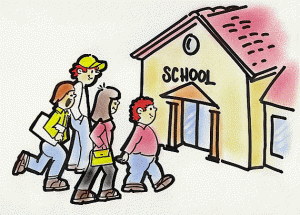An autism parent recently contacted me to ask if I knew of any high schools with special autism programs because she feels that she may be pulling her children out of the school that they’re currently in. Why? Because her son, whom is getting grades of around 80%, is at risk of losing his EA (education assistant) as well as the aides that help him to get his work done, such as a keyboard since he can’t write. Why are they taking these things away from him? Because he’s getting good grades. Why is he getting good grades? Because he has these things.
A similar scenario happened for me as my own son approached the age to go to school for the first time. In the beginning we were promised a special program but as we made progress with him, that was changed to him having an EA with him in class. The following year, we were informed that he’d get no assistance at all and would be put into a regular class.
We moved.
So why are good kids making good progress being punished? Funding. The government only gives a certain amount of money to these programs and then it’s up to these programs to figure out where the money has to go. That means prioritizing.
If your child is making good progress, then the funding is “reallocated” towards another child that isn’t doing as well and therefore needs that money more. It makes sense on paper. In the real world though, with real human beings, that sounds like those at the top are being punished. It’s clearly not as simple as “he doesn’t need it as much.”
This sounds pretty terrible already but what happens when the funding gets cut and is now lower than it was before?
This is basically happening everywhere but you likely won’t hear much about it. Locally, where I am in Ontario, it’s happening right now. And even though I can link this news story to prove it, I can also pretty much guarantee that no one in Ontario (aside from the schools) knows it’s happening.
“To lose educational assistants? Those people help the most vulnerable students, the kids with learning disabilities, the kids with autism, the kids that are struggling. It’s shameful that this is what the government is doing and that they sold the people the opposite bill of goods in the election campaign.”
People are losing their services as they age out (become adults), as they make progress and as the government decides it. Services that they really need! It feels a lot like “robbing Peter to pay Paul.”
Unfortunately there’s very little we can do. Those people at those programs can’t do anything to help even if they wanted to, which I’m sure they do. But they can’t justify continuing to give your child that money when another child might need it more.
The only real answer is adequate funding. Which seems pretty silly with all of the attention that autism has had in recent years. Most of the states in the US now include autism therapies within their insurance plans, most everyone has heard of it by now and several schools even have specially dedicated autism programs. And yet governments continue to make cuts.
The take away? If you want your child with autism to continue having services, don’t let them do well. Because the reward for doing well is punishment.
And just in case you think this isn’t a very serious and very real problem, let me leave you with these from various places and various years:














